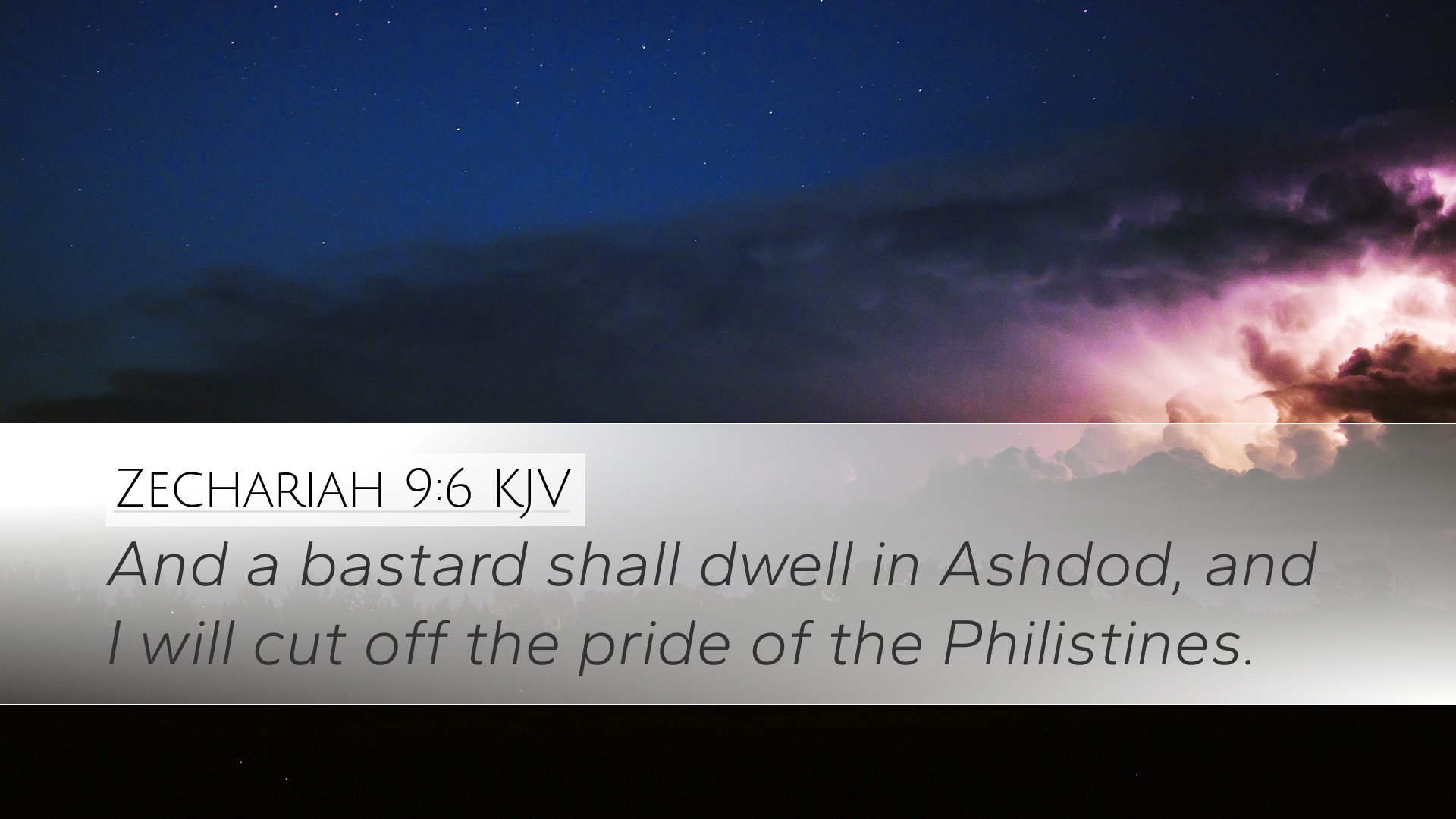Old Testament
Genesis Exodus Leviticus Numbers Deuteronomy Joshua Judges Ruth 1 Samuel 2 Samuel 1 Kings 2 Kings 1 Chronicles 2 Chronicles Ezra Nehemiah Esther Job Psalms Proverbs Ecclesiastes Song of Solomon Isaiah Jeremiah Lamentations Ezekiel Daniel Hosea Joel Amos Obadiah Jonah Micah Nahum Habakkuk Zephaniah Haggai Zechariah MalachiZechariah 9:6
Zechariah 9:6 KJV
And a bastard shall dwell in Ashdod, and I will cut off the pride of the Philistines.
Zechariah 9:6 Bible Commentary
Commentary on Zechariah 9:6
Text of Zechariah 9:6 (KJV): "And a bastard shall dwell in Ashdod, and I will cut off the pride of the Philistines."
Contextual Overview
The book of Zechariah is set during the time after the Babylonian exile when the Jewish people were returning to Jerusalem to rebuild the temple and their identity as God’s chosen people. The verse we are focusing on encapsulates profound themes of judgment, restoration, and prophecy concerning the enemies of Israel, particularly the Philistines.
Insights from Public Domain Commentaries
Matthew Henry's Commentary
Matthew Henry emphasizes the gravity of divine judgment esteemed in this passage. He notes that the mention of the "bastard" indicates a sense of removal from covenant relationship and legitimacy. In biblical terms, a "bastard" symbolizes those outside of God's promise; therefore, the foreshadowing of such a presence among the Philistines portrays a grim fate for those who stood against Israel.
Furthermore, Henry interprets Ashdod as a representative city of the Philistines, a place that epitomizes their pride and defiance against God. As God speaks about cutting off the pride of the Philistines, He signifies both a physical destruction and a spiritual humiliation. This is reflective of the broader principle that pride goes before destruction, a theme prevalent throughout Scripture.
Albert Barnes' Notes on the Bible
Albert Barnes offers a detailed commentary, highlighting that the term "bastard" symbolizes illegitimacy and reproach. In this regard, Barnes expresses that this verse serves as a prophetic declaration regarding the downfall of the Philistines, indicating that they would suffer disgrace and depopulation. The term in the original Hebrew carries connotations of contamination and disfavor, emphasizing the divine judgment that is to befall them.
Barnes also draws attention to the geographical significance of Ashdod, one of the Philistine cities, stressing that God’s judgment is precisely targeted and deliberate. He suggests that the cutting off of the pride of the Philistines signifies a pivotal moment, whereby not only their power would be diminished but also their influence and legacy would be eradicated, aligning with the overarching themes of restoration and hope for God's people.
Adam Clarke's Commentary
Adam Clarke approaches this verse with a focus on the implications of the term "bastard" and its socio-cultural ramifications. Clarke reflects on the idea that the association with impurity and rejection resonates through the history of the Philistines, suggesting that their very identity was marred by their opposition to Israel. His insights underline that this judgment is comprehensive, affecting the entirety of Philistine society.
Additionally, Clarke highlights the symbolic representation of Ashdod as the seat of idolatry and opposition to the worship of the One True God. He illustrates that God’s ability to cut off the pride of the Philistines extends to the broader theme of His sovereignty over all nations and peoples, heralding a divine order that ultimately brings about justice. Clarke suggests that this serves as a reminder for the nations' accountability to God, inviting contemporary readers to reflect on their own pride and rebellion against divine authority.
Theological Reflections
Theologically, Zechariah 9:6 provides rich material for understanding the nature of divine justice as well as God’s enduring covenant with His people. It reminds us of the serious implications of sin and pride, not only in individual lives but also within broader societal structures. As we consider the prophecy's fulfillment, we see how God's word remains active, establishing the notion that no prideful nation can stand before His righteousness.
- Divine Judgment: The verse teaches us that God’s judgment is certain for those who persist in pride and opposition to His purposes.
- Hope for Restoration: For the people of Israel, this judgment signifies a future hope where they are restored, highlighting God's faithfulness to His covenant.
- Sovereignty of God: The passage affirms God's complete sovereignty over all nations, asserting that ultimately, every knee will bow.
Application for Today
From a practical perspective, Zechariah 9:6 speaks volumes to believers today. It serves as both a warning and encouragement.
- Self-Examination: Individuals and communities are invited to examine their own pride and alignment with God’s will.
- Recognition of God’s Authority: Pastors and theologians can inspire congregations to recognize God’s authority in all realms of life, social justice, and community leadership.
- Encouragement to Remain Faithful: This verse encourages believers to remain steadfast in faith, knowing that God opposes the proud but gives grace to the humble.


